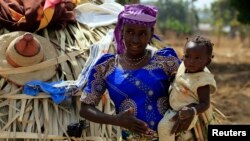The African continent is primed for a massive baby boom within the next four decades, a shift that the United Nations’ children’s agency says represents both a challenge and a huge opportunity.
By the year 2050, UNICEF predicts in a report released this week, Africa will be home to about 41 percent of the world’s births. By that time, one in four people on this planet will be African.
The boom is caused by several factors. Africa is already home to one of the world’s youngest populations – and within the next few decades, those youngsters will reach reproductive age. The continent also has, for many reasons, high fertility rates and has seen a reduction in child mortality, meaning that more babies and children survive than ever before.
Africa’s booming population will shift global dynamics, said Thi Minh Ngo, a UNICEF economic and social policy specialist based in Dakar, Senegal.
"We can see that Africa is the one continent that keeps growing very fast in terms of population size, while the other parts of the world, the other regions like Asia and Europe, the sizes are going to stabilize," Ngo said. "… This rapid rise of population on the African continent is going to drive the wave of population across the globe in the next 30 to 50 years."
That growth won’t be universal, Ngo said. Some African nations, such as Botswana and South Africa, have relatively low fertility rates that are comparable to developed nations.
Most growth likely in East, West Africa
UNICEF predicts most of the boom will happen in East and West Africa, which have high fertility rates.
Nigeria, whose 177 million people already make this the continent’s most populous nation, is projected to continue its rapid growth. It may account for one in 10 births by 2050 – and may even reach nearly half a billion people.
One bundle of joy, many parents say, is work enough. But in the next 35 years, Africa’s women will give birth to nearly 2 billion of them – presenting a massive public policy challenge.
This is a double-edged sword for governments, Ngo said.
If they can begin to prepare immediately, she said, they can harness the power of that youthful, exuberant, productive population.
Youth investment needed
That means governments need to start looking urgently at health and education sectors, Ngo said.
“We need to invest much more” on youth, she said. “Otherwise, we are going to just be running behind the train of providing adequate services for this population.”
The population boom also presents “an amazing opportunity,” Ngo said. “You have this youth, which is a driving force for the continent, and that is unique to Africa because the other regions of the globe are actually witnessing aging of the population.”
The United States’ post-World War II baby boom, which produced some 76 million babies, transformed the nation’s economy and society.
Likewise, this continent’s baby boom is sure to have wide-ranging consequences for African societies, for world power dynamics and the world’s economy.




